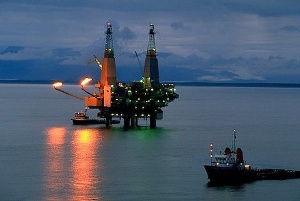ZEN Petroleum, an indigenous oil marketing company in the country, has asked the National Petroleum Authority (NPA) and the Ministry of Energy and Petroleum (MoEP) to intervene with policies to help grow indigenous businesses in the downstream oil sector to ensure profit retention as against the capital flight by the multinationals companies.
The Oil Marketing Companies (OMC) business in the country is valued at some US$40million a year and it is currently dominated by multinationals -- with Shell Ghana, whose products are marketed by Vivo, and TOTAL being the biggest.
Mr. William Kwadwo Tewiah, Managing Director ZEN Petroleum, in an interview with B&FT said: “If we don’t take time the OMC business will go the way of the telecommunications companies, where there will be no Ghanaian business just foreigners.
“Unless there is some policy direction to tilt the trend toward local businesses, then I'm afraid competition will take indigenous businesses out.
“We have had that experience before, and if we still have to compete with companies that are owned by oil traders who determine the price of oil going into a country, then it tells you the challenge we are facing.”
Mr. Tawiah commenting on the country’s local content, explained that local content is not about local employment; there is a big difference between local content and local employment.
He explained that local content is about ownership of the business in the country: “It is not about how many Ghanaians are employed -- so local content is what happens in Dubai, where the Emiratis own the companies but they employ foreigners.
“But the important thing is that the profit remains in the country, the profit adds to the wealth of the country because people in the country who are making the profit take the decisions; they have management control of the companies. That is what local content is all about.
Local content, he said, “is when you have banks, media houses, hospitals, industries, that are Ghanaian-owned or have the majority shareholders here, then the profit stays here”.
Mr. Tawiah indicated that ZEN Petroleum had in years gone by been barred from bidding for certain contracts in the mining sector, “simply because we are a local company”.
He observed that there is an element of confusion that the country needs to clear up regarding the local content direction.
“Local content is about who owns the company. It is about how many Ghanaians are getting profit from companies that they own, and not how many Ghanaians are being employed.
“In the downstream sector there are 105 oil marketing companies, but the important thing to point out is that the top-two are foreign companies and they have the largest market share -- and that is bound to grow because we’ve also licenced more of them to come.
“There are other foreign companies that are coming to participate in the local downstream sector,” he stated. ZEN Petroleum -- which currently supplies about 10 million litres of diesel to some mining companies, including Goldfields Ghana Limited -- Mr. Tawiah said started operations four years ago with a specialisation in fuel-supply to the mining companies; a segment of the business that is even more challenging.
He said although the company is young, it has grown its market share from zero percent in 2008 when it started to about 50 percent in the mine-fuel supply business.
The company recently set up an agency in Mali to supply fuel to mining companies in that country, with plans to establish another in neighbouring Burkina Faso.
“We are confident of making a mark in the OMC business in spite of the firm grip that multinationals have in the industry,” Mr. Tewiah remarked.
Business News of Saturday, 23 August 2014
Source: B&FT
Local content intervention needed to grow petroleum sector
Entertainment












